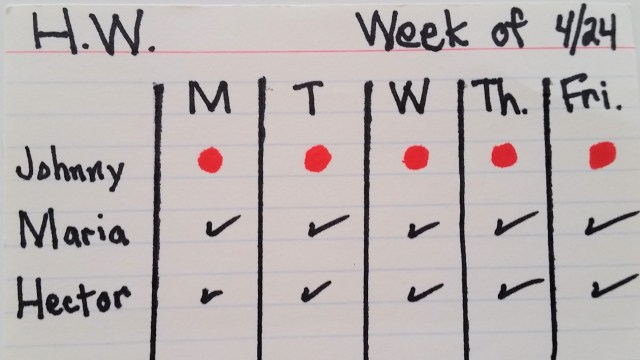In honor of summer vacation, Crazy Teacher, my alter ego, will be posting to this blog. Crazy’s advice for dealing with difficult people and situations is, “Show them that you are crazier than they are.” Here is the last excerpt (for now) from The Crazy Teacher’s Advice Book.

Question to Crazy Teacher
I suspect in your previous posts you were reliving some of your own experiences being a crazy teacher. Are you the only crazy one out there? How about telling us about some other Crazy Teachers.
Crazy Teacher’s Answer
Sure. I’d like to use this July 31st. day to honor some of the Crazy Teachers who were legendary for their mastery of that transformative tool in the teacher tool box—THE LOOK!
Helen Fastucken could get any seventh-grade boy to stop playing with his crotch. When Helen, arranged herself (with great decorum) on her chair, raised her hands as if she were beginning a piano concerto, and then returned her hands to her desk, many young hands rose from the depths, and arrived on the top of their desks.
Helen Primsly was also known for her non-verbal sign language. Hector knew when Helen scratched her nose that she observed him picking his, and, if he knew what was good for him, he should search for his boogers elsewhere, and not on school time.
Helen Fiddlowsky even while out of her classroom and riding on a New York City subway, could, with one look over her bifocals, turn known hoodlums into ladies and gentlemen who offered their seats to elderly passengers.
Helen Chan could quiet a screaming elementary cafeteria by simply raising her hand and adopting a walking dead face, but she was legendary for her mystical power to switch signals at faculty meetings. During yet another workshop on data collection, Helen (with her back to the long-winded consultant) put on her googly-eye glasses and nodded sagaciously at the faces of her red-faced, lip-biting colleagues as they struggled to maintain their decorum.
Crazy Teacher’s Tribute to a Mentor and Colleague
On this last day of July, when Crazy Teacher crawls back in her crypt, this post is written in tribute to my own Crazy Colleague and Older Friend, Helen Chanowsky. Goodness, we had some great times together!


